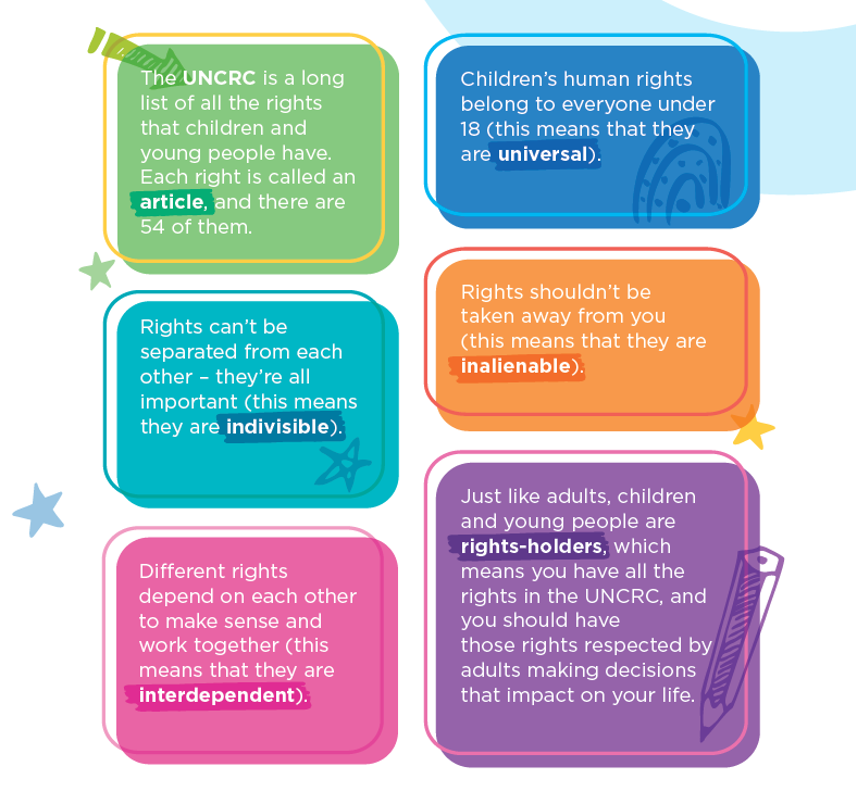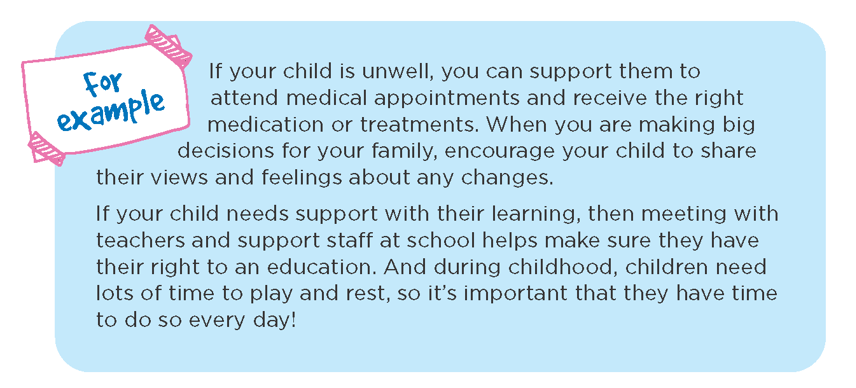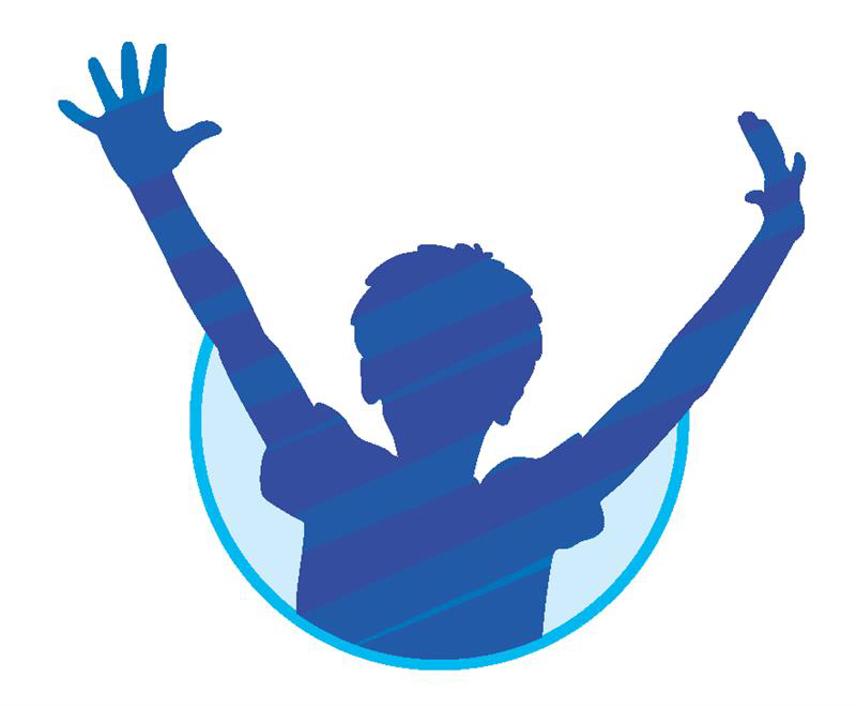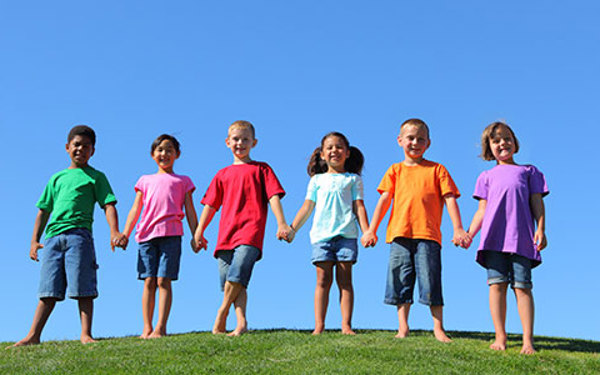What are children's human rights?
Children’s human rights are special rights you have during childhood because children and young people need extra support, protection and care growing up. They are things that keep you safe, make sure you’re healthy – mentally and physically – and help you speak up about what’s going on in your life. Children’s human rights also support adults with their responsibilities to respect and protect children and young people.
Children’s human rights are not new – in 1989, the United Nations created a list of all the rights that children have, called the Convention on the Rights of the Child also known as the UNCRC. By signing the UNCRC, the UK agreed that all children should have these rights in their lives.
Visit the UNCRC website to watch a short video about rights from the Children and Young People's Commissioner's office.
What is the UNCRC?
This document has been signed, or agreed upon, by all the countries of the world (except one – the United States of America)!

What are the Articles of the UNCRC?
The full articles in the UNCRC are long and detailed and use legal language. To help you better understand the articles, we have grouped each article under seven themes. By breaking it down this way, we hope you can see how each right connects to children and young people’s lives.
- Children’s human rights belong to everyone up to age 18 (Article 1)
- Children have the right to be free from any discrimination (Article 2)
- Adults should think about children’s best interests when making decisions that will impact them (Article 3)
- Children have the right to a name and to belong to a country (Article 7)
- Children have the right to their own identity (Article 8)
- Children have the right to privacy (Article 16)
- If a child is a refugee, they still have all these rights (Article 22)
- If a child is accused of breaking the law, they have the right to legal help and to be treated fairly (Article 40)
- Children have the right to get advice and guidance from their family (Article 5)
- Children have the right to live with their family if that’s what is best for them (Article 9)
- Children have the right to stay in contact with their family if they live in a different country (Article 10)
- Children have the right to be brought up by both parents if possible (Article 18)
- Children have the right to the best care if they’re adopted (Article 21)
- A child’s family should get the support and money needed to bring them up (Article 26)
- Children have the right to food, clothing and a safe home (Article 27)
- Children have the right to speak their own language and follow their family’s culture and religion (Article 30)
- Children have the right to share their experiences, opinions and ideas and be taken seriously (Article 12)
- Children have the right to express themselves (Article 13)
- Children have the right to their own thoughts, beliefs and religion (Article 14)
- Children have the right to meet up with friends and join groups (Article 15)
- Children have the right to get information, as long as it’s safe (Article 17)
- Children have the right to an education (Article 28)
- A child’s education should develop their interests and talents and their respect for other people and our environment (Article 29)
- Children have the right to relax, play and take part in cultural activities (Article 31)
- Children should not be removed from their country illegally (Article 11)
- Children should be protected from being hurt or treated badly (Article 19)
- Children have the right to special help and protection if they can’t live with their family (Article 20)
- If a child doesn’t live with their immediate family, then someone should make sure they are safe and happy in foster/kinship care (Article 25)
- Children should be protected from doing harmful work (Article 32)
- Children should be protected from dangerous drugs (Article 33)
- Children should be protected from sexual abuse (Article 34)
- Children should not be abducted, sold or trafficked (Article 35)
- Children should be protected from any form of exploitation (Article 36)
- Children shouldn’t be punished in a cruel or hurtful way (Article 37)
- Children have the right to be protected during war and not to join the army until they are at least 15 years old (Article 38)
- Children have the right to live and grow up well (Article 6)
- If a child has a disability, they have the right to special care and education (Article 23)
- Children have the right to good quality health care and information about their health (Article 24)
- Children have the right to get help and recover if they’ve gone through something difficult (Article 39)
- The Government should make sure children’s human rights are respected (Article 4)
- The rights in the UNCRC are the minimum, and where the Government does even better for children, then they should keep it up! (Article 41)
- The Government should make sure everyone knows about children’s human rights! (Article 42)
- There are eleven more articles which help Governments make rights real for all children. (Articles 43 – 54)
To learn more about all of the different rights in the UNCRC, visit the Children and Young People’s Commissioner Scotland’s website.
Printable Resources
What should I do if my rights aren’t being respected?
The Children and Young People’s Commissioner is there to help children in Scotland. The website provides information on children’s human rights, advice if you’ve got questions or concerns, and the Commissioner can hear complaints from a child, young person or a group of children/young people if they feel like their rights haven’t been respected. Visit their website to get help.
Advocates support individuals or groups to represent their views and speak up about certain issues. This can be on a short- or long-term basis, it can be one-to-one or collective, and it can help if a child or young person is involved in Court, in a Children’s Hearing or other settings where decisions are being made about their life. For more information about advocacy, visit the Scottish Independent Advocacy Alliance website.
Sometimes, a child or young person might need a lawyer, or solicitor, to represent them in Court, or they simply might need some advice. There are organisations that are specifically for helping children, young people and their families navigate tricky legal situations.
If you have any worries or questions about anything impacting on you or your family, there are services who can give advice or point you in the direction of someone who can help.
How can parents and carers help make sure children’s rights are respected?
Children’s human rights keep children healthy, happy and safe and they also help support and protect the family by recognising the importance of families – however they may look – in children’s lives. The UNCRC points out what support they should receive from the government to give their children a good childhood.
As a parent, carer, family member, or other supporting adult, you can play a part in making sure your child’s human rights are being respected and upheld. The UNCRC helps adults understand children’s human right and provides helpful language to support children every day. gives adults the right language and knowledge to support children every day, sometimes at times when you don’t even realise it. You can make sure that children’s human rights are protected in different areas of their lives, for example at home, at school or nursery, at sports clubs and at the doctors or hospital.

What else can you do to make sure children’s human rights are respected?
- Continue to learn more about the UNCRC and the articles describing children’s human rights
- Have conversations with your child about what human rights mean for them and your family, and the lives of children and families around the world
- Ask your children about their views and be curious about how they see the world
- Help your child recognise diversity and have empathy for other people’s experiences
- Support your children to speak up if something is unfair or hurtful or speak up on their behalf
- Raise any issues that impact on children’s human rights with schools, sports clubs, doctors, social workers and other professionals – ask for help if you aren’t sure how to
- Take part in campaigns and protests
What’s happening in Scotland to support children’s human rights?
Here in Scotland, decision makers in the Scottish Government and your local authority are taking a rights-based approach to what they do. This means that children’s human rights are central to how they do their work and how they engage with children and families. This is important because the Scottish Parliament is currently developing legislation that would make the UNCRC become law in Scotland. This is called ‘incorporation’ and you can learn more about it here by visiting the Scottish Alliance for Children's Rights website.
Some examples of where children’s human rights have been respected and upheld include:
- free school meals for eligible children and young people
- increase to Scottish Child Payment
- school clothing grants
- free period products are provided in public spaces, including libraries, schools, youth clubs and universities
- changes to the law to help brothers and sisters stay connected if they are in care
- And since 2017, children and young people have also had an annual meeting with the First Minister and other MSPs to discuss issues that are impacting on their lives directly with the First Minister and Cabinet Ministers.
Children's Human Rights at Children 1st
As Scotland’s national children’s charity, Children 1st aims to take a rights-based approach to all aspects of our work, including recruitment, service design and delivery. This means working collaboratively alongside families to ensure their voices are heard and that children’s best interests are considered in all decisions that affect them.
Our staff work together with families to help them understand their rights and improve their awareness. We also work to reflect the experiences and stories of the people we work alongside in our policy and influencing work, including by advocating for a human rights-based approach to developing policies and legislation.
We have an internal Children's Human Rights Working Group, which has developed an action plan for embedding rights across the organisation. Key pieces of work include children's human rights training for staff, resources about children's human rights for children, young people and families, and rights-based guidance.
Children 1st is a member of the Scottish Alliance for Children’s Rights (Together Scotland). We work collaboratively with partners on key issues to encourage implementation of the recommendations from the UN Committee on the Rights of the Child through longstanding campaigns, such as those for the equal protection for children from assault, the right to recovery services and access to justice.


